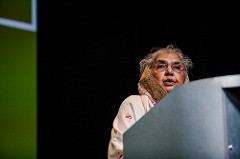“I express my sincere gratitude to IFPRI for its strong presence in Bangladesh conducting demand-driven food and agricultural policy research and providing evidence-based policy support to the government.”
- Matia Chowdhury, Minister of Agriculture, People’s Republic of Bangladesh
Despite improvements in agricultural production and food availability, Bangladesh continues to face persistent and emerging challenges such as worsening soil fertility, population growth, climate change, poverty, and access to natural resources, making millions of people vulnerable. The Government of Bangladesh has been partnering with IFPRI since the 1990s to develop evidence-based research on food aid, agricultural technology, gender dynamics in extension programs, nutritional interventions, and poverty reduction investments to inform policymakers.
In 2010, IFPRI, with the Government of Bangladesh Ministry of Agriculture and the United States Agency for International Development (USAID), organized the Bangladesh Food Security Investment Forum, which started the Bangladesh Policy Research and Strategy Support Program—an instrumental initiative designed to improve agriculture, and food and nutrition security. This program has led to the launch of the Agricultural Policy Support Unit that delivers real-time information such as the likely size of the next rice crop to inform decision making, and the evaluation of the country’s largest safety net program that encouraged the government to renew the program. Today, Bangladesh has adopted policies emphasizing strong food and nutrition security.
As an honored guest at IFPRI’s 40th Anniversary Event on November 18, 2015, the Honourable Minister Matia Chowdhury spoke on the significant improvements in agriculture and food security in Bangladesh.



